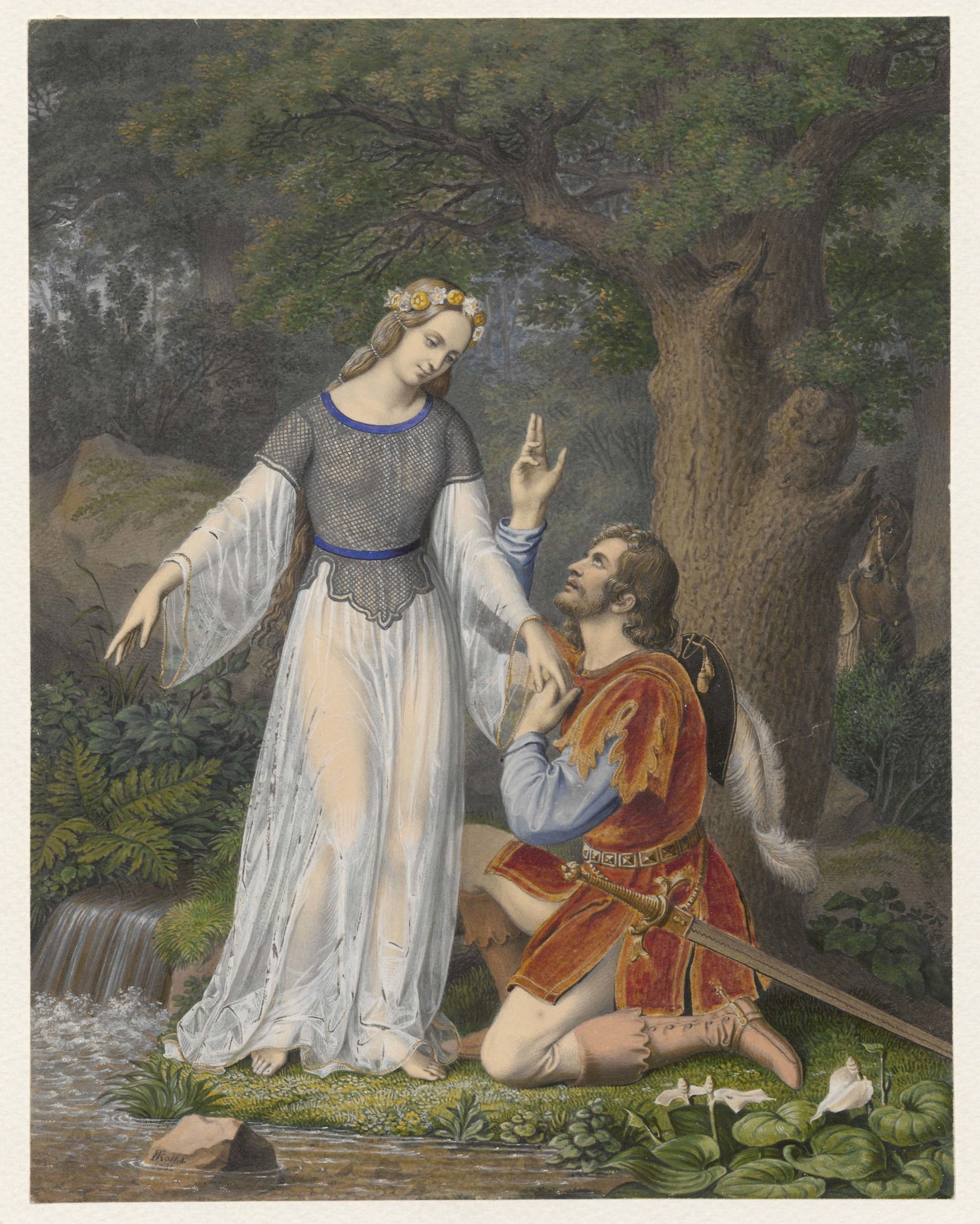
From the moment the flower garland was replaced with a crown upon her head, Wanda was loved by her people and lauded as the embodiment of perfect beauty and power uncorrupted. Possessed of good looks, grace, serenity, inner strength and charm, even the nation's most ruthless enemies were said to willow at the sight of her almost radiant countenance and intimidating virtue. More than a pretty face, Wanda is also said to have possessed military talent, personally leading her troops into battle and repeatedly repelling challengers who perceived her as weak, her throne as 'vacant,' and her lands as for-the-taking.

The list of Wanda's rejected suitors even before she assumed the throne was apparently a long one, but the most famous of her prospective paramours was a powerful Leman tyrant (according to Kadłubek); named 'Rytygier' (Ruediger) in later versions of the story, we've likewise adopted this name for our purposes here. [During the highly-patriotic periods of Polish partition, Rytygier would be recast as a German prince, and Wanda's brutal rejection of him would earn her cycle of legends the snarky, still commonly used title, 'About Wanda, Who Didn't Want a German' (O Wandzie, co nie chiała Niemca).]
The Tragic Tale of Wanda & Rytygier
(an ancient Cracovian legend, as reinterpreted by Kraków IYP)Wanda's reign was still in its infancy when the powerful Lord Rytygier sent an envoy to Kraków with a letter for the young Queen, wherein he promised her great wealth and gifts, but threatened to take her and her kingdom by force if she would not submit willingly. Upon reading it, Wanda quietly composed a curt reply and gave it to Rytygier's courtiers. When the document reached Rytygier, he unsealed it to reveal only four words written above the Queen's signature:
I would rather die.
Enraged, the affronted ruler resolved to personally realise Wanda's request. Kraków would be burnt asunder with a fury unmatched by any army or beast, and its famed virgin queen would be personally devoured by Rytygier the Dragon. He gave the orders for his armies to amass from across the many corners of his kingdom, and begin marching on Kraków at once.
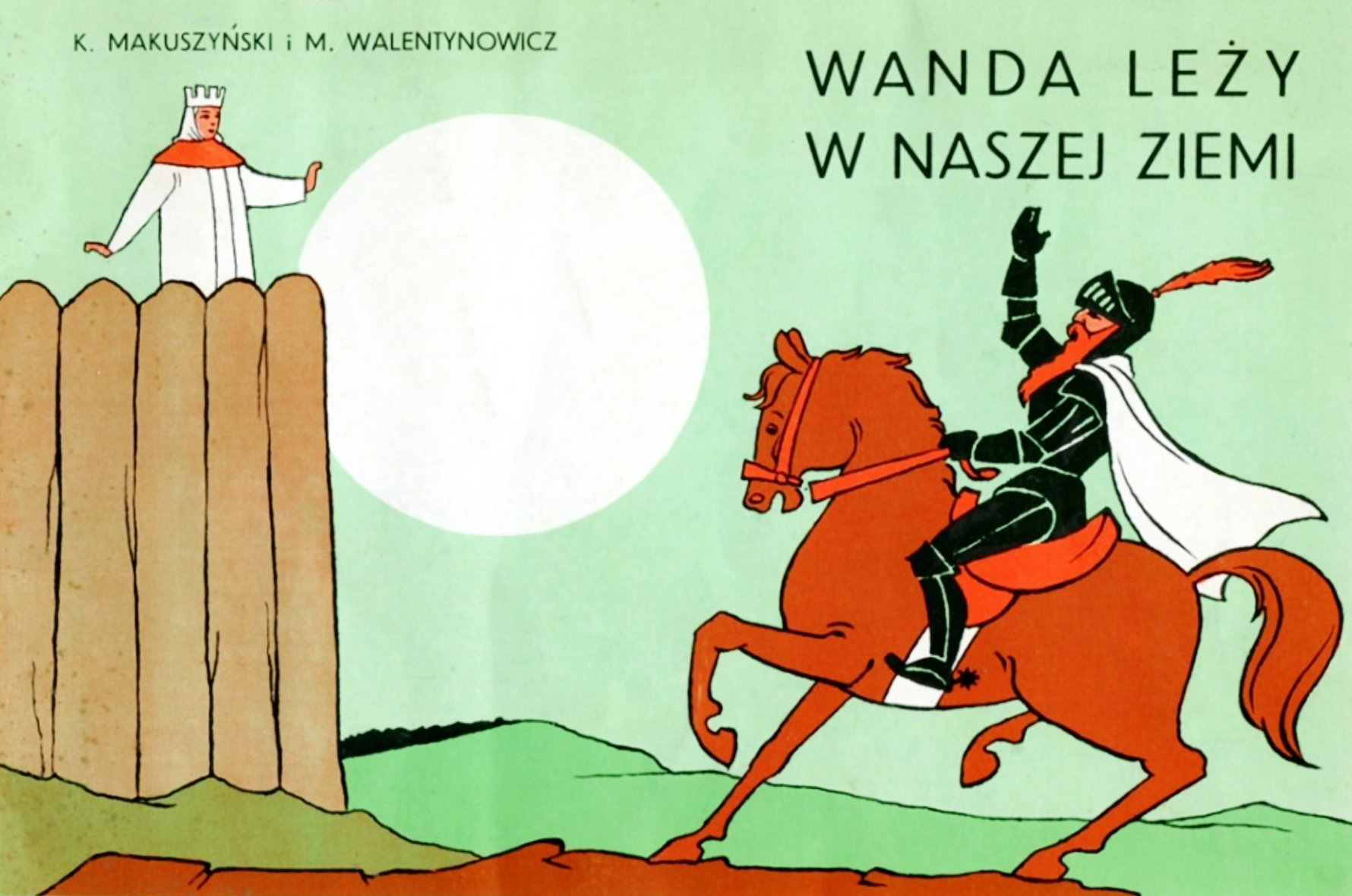
Very soon, in the city built upon Wawel Hill, word was arriving from far and wide that Rytygier's vast military was consolidating against them to the south. Wanda knew that her own forces, depleted from previous campaigns, stood no chance against Rytygier's, and armed opposition would be futile. Nonetheless, her faithful subjects were ready to die defending her honour. Knowing all this, the Queen conceived a plan to sneak out of the castle at Wawel and go alone to meet Rytygier on the outskirts of the city, hoping to prevent its destruction in this way. Whether she was ready to surrender or commit suicide is speculation; in all likelihood her mind was yet unmade when she disguised herself in peasant dress and snuck out of the city under the cover of night, crossing the river to Dębniki and setting out on foot to meet her fate.
Her subterfuge was a failure. Queen Wanda's maidservant quickly realised she was missing and sounded the alarm within the royal court. The Queen's knights knew that Rytygier's army was encamped to the south and mobilised to meet him there, marching at dawn, ready to die by their swords defending the Cracovian throne.
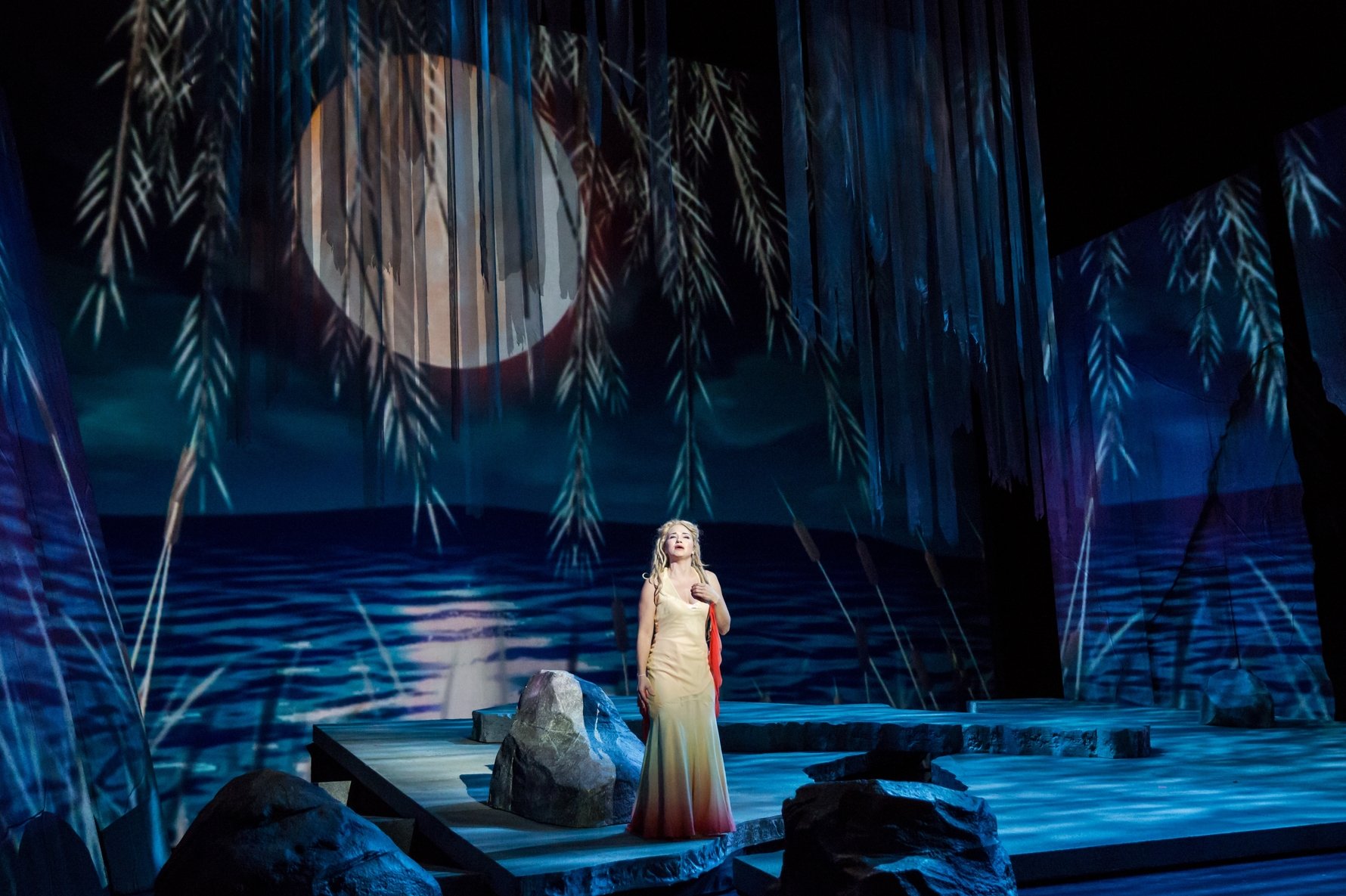
Meanwhile Wanda followed the winding Wisła, wracked with anguish until she could no longer continue and laid down to rest on the riverbank. In the early morning light some local raftsmen spotted a sleeping female figure by the water and rowed closer, initially drawn by its beauty, only to be disoriented by the blinding smithereens of the sun reflected on the water. Reasoning that it must be a rusałka (river spirit), the superstitious raftsmen floated on, daring not to disturb it.
Soon after she awoke, and as Wanda carried forth once more, unbeknownst to her, an army was amassing not only ahead of her, but also on her trail. Word had not only spread throughout Kraków of her disappearance, but the raftsmen - having encountered the cavalry crossing the river - now realised that their enchanted vision was none other than the Queen herself; the bugles sounded for every guild in Kraków to take up arms, and soon every able-bodied man was armed and marching swiftly in the direction of Rytygier's camp to defend the helpless, young queen.
Wary of being seen by the river, Wanda set course through the forests until she came to a clearing near Skotniki, 10km south of the castle, beyond which she saw Rytygier's army gathered in all its might. Clouds had rolled over the sun and the light was muted over the dozens of tents, black flags and war banners blazoned with menacing dragons that stood only 500 metres away. The Queen stepped out of the trees and saw that Rytygier's warriors were not only awake, but ready for battle. Standing alone and exposed before the opposing army, Wanda surveyed the grey faces of the men as they began to gather in a line at the edge of their camp; their silent, stoic faces stared back. She then looked upon herself - a young queen on the battlefield of her destiny, in the long, plain dress of a commoner; a lamb for the wolves, a maiden for the feast of the dragon. She saw Rytygier - unmistakable Rytygier, in his black mail and breastplate - as he stepped to the fore of the crowd and met her gaze. Slowly, she began to undress.
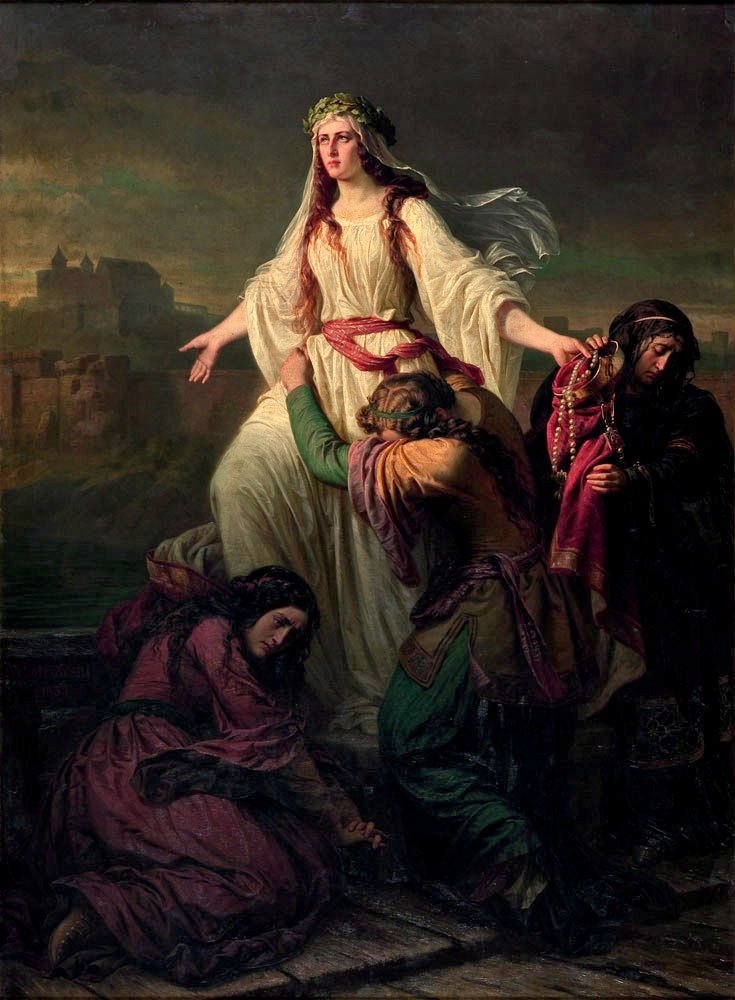
Stepping out of every last garment, Wanda, Queen of Kraków, stood prone and naked before Rytygier and his men, then strode intently towards them without a word. As she did so, the air was suddenly broken by the loud braying and snort of a horse, as behind her the Cracovian calvary - followed closely by half the citizens of Kraków - began to emerge from the treeline. Not yet halfway across the field, Wanda stopped, stood straight and still to the measure of ten long beats as the opposing combatants came into one another's view, then pushed her shoulders back and projected her voice so that it would be heard across the entire battlefield, the entire kingdom, the entire breadth of her people's history.
This is what she said:
I, Wanda, daughter of Krak, Queen of Kraków,
Stand naked before you on the fertile lands of the Wisła,
A maiden chained to the stone of your swinish greed
For my lands, for my people, for my body.
As she spoke the sun burst the cloud bank and shone brightly upon her in a single dense, dazzling ray. Her beauty was astonishing, and it gripped the gaze of every man on the battlefield in its hypnotic glare.
In my chastity I have given my whole self
For the good of my people
So that the unpolluted light of my heart
May shine upon them like the sun
And nourish them.
So that the uncorrupted virtue
Of an innocent girl that was given to rule
May be a beacon across this kingdom
Bringing out the goodness
Of every man, woman and child within its borders.
The love I have defiantly kept locked within,
Sequestered from the reaching hands
Of every brute that would rip off my royal gown,
It is for my people alone.
At this the soldiers that stood facing her brave beauty seemed to lose their grips on their weapons, some of them dropping them entirely, and several more striding calmly towards her in blank defiance of the tyrant they had served but moments before.
On my soul, I will not satisfy your lust to rule
Over that which has been faithfully entrusted to me.
This body, this land. It is not yours to possess.
Just as the white lily wilts when picked,
This sinless skin and the earth it stands upon
will wither at your touch.
As my father felled the dragon with a poisoned ram,
Should you, Rytygier, cast your odorous breath upon me,
I will make this heart so black with hatred
That it blights my womb, spoils my youth,
Steals my beauty, and makes me a hag.
I will spite this kingdom with my righteous scorn
So that the fields don’t yield,
The trees bear no fruit,
The cows give no milk,
The hens fail to lay,
And the river turns yellow
Like the bile in my blood
When I look at you.
The Dragon Prince Rytygier was nearly alone now in his shame. His sword was drawn and it trembled in his hand. His legs were weak and his stomach was sick with humiliation. He could feel the cold judgment of all the eyes on the battlefield as they gazed upon him in disdain. He saw that he had no army now, no knights to defend his injured pride, no soldier who would stand against the maiden queen who defied him. She had skewered him with her words, and now his own men assailed him with the slings and arrows of their insubordination as they stood dumbly, or began to walk the 500 metres across the scene of his defeat. Rytygier could not summon the strength to admonish them. He could barely stand, he was so sick with grief over his loss. He watched as a soldier wrapped a banner around Wanda to cover her nakedness, and lead her away. They turned their backs on him, all of them, and as the judgement came down he fell to his knees and felt the blade deep in his belly. The blood ran down over his gloved hands and dripped from the hilt. He slumped.
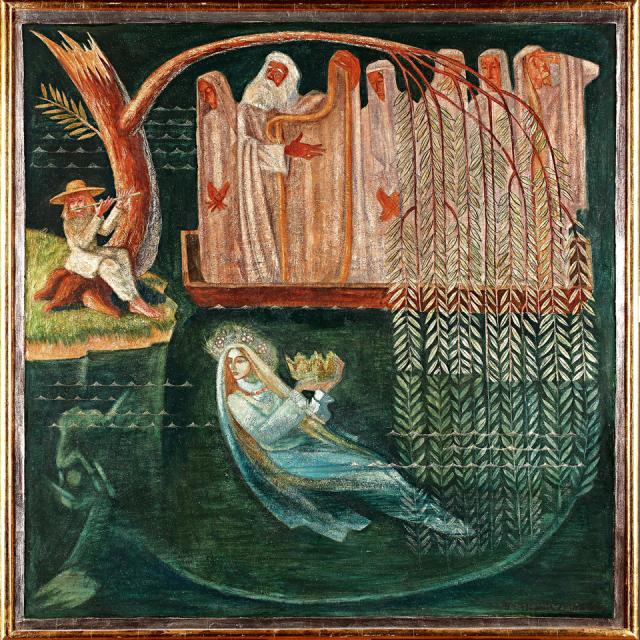
The Death of Wanda, Undone by Virtue
Safely returned to her castle on the hill, the crowds gathered at Wawel in exultation of their victorious Queen. The celebrations lasted for weeks as the mead flowed, the music played and Wanda’s legend spread across the land. They sang of her defiant courage and naked beauty as she faced down her enemy, the barroom bards going into every bawdy detail of her heavenly charms. She had vanquished the invaders and strengthened the kingdom without a drop of blood spilled. She had faced her own dragon, and defeated it; and in doing so become a woman unmatched by, and above the merit of, any other man or sovereign. The people praised her as an even greater ruler than her father. She had won the eternal love of her subjects and the sainted respect of all who heard her tale.
But within the castle tower, Wanda remained silently alone in her bedchambers, and she suffered. Blood had been shed, and Rytygier, repentant in death, had taken something from her she could never restore - her innocence. In the moment of her indignant defiance of her adversary she had let rage into her heart, and now it festered there as glowering resentment. The naivete of her youth was lost, she felt disrobed each time a man gazed upon her, scrutinised till her skin crawled. She was alone, and would always be alone, because she was unattainable, even to herself. She couldn’t live up to her own ideals, or those cast upon her. Her beauty and virtue were a burden she could no longer bear. She ached for her father. She felt a weight on her heart she couldn’t lift.
In her despair, Wanda determined that she would never have peace as long as she wore the crown. Foreign suitors would forever harass her with their proposals, using her refusals as pretext for invasion. She was a liability to her people, undeserving of their praise, undressed by their stares, unable to meet their expectations of perfection. She yearned to put the ugly peasant dress back on and escape to the woods, but she knew she would have no sanctuary there. She could run back to the battlefield and behave differently this time, submit to Rytygier or die as she had childishly written. She took off her gown and opened the wardrobe, but the dress wasn’t there. She laid back on her bed and wished for a letter to come, for sleep, for death. Her thoughts turned to Rytygier in his black armour ready to ravish her naked body. Why had he not spoken? Where was his fury when she had assailed him with her spite? Had he desired her so badly as to take his own life?
The window was open and campfires burned along the riverbank. Dogs were barking and there was nowhere to go. She took the glowing candle from her nightstand and stepped over the sill into the cool, still night air. It gave her gooseflesh, but she sat there a moment, holding the candle near her chest so that someone might notice her. Then, slowly, she slid her legs forward and the candle went out.
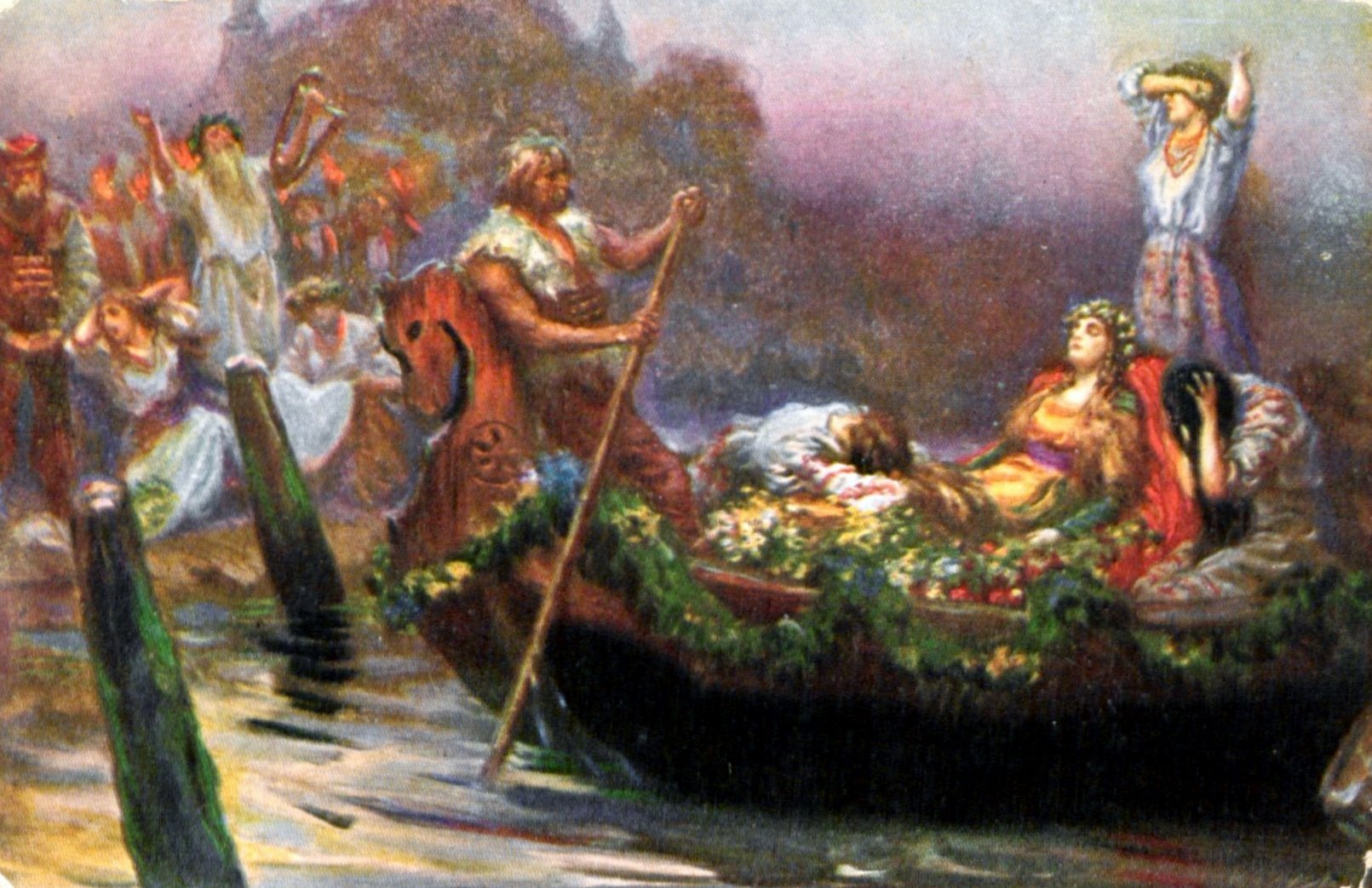
Wanda is Laid to Rest
Two fishermen pulled Wanda’s body from the river and placed it on a wooden cart, which was wheeled into the town square for want of better reasoning. The people in their grief could hardly bear to look at their queen, whose skin was pallid and lifeless, and needed to be covered up. As the mourners gathered in the hundreds they took fresh flowers from the market and placed them on the body until they hid her immodesty. A beautiful flower garland was placed on her head and coral beads around her neck. All day she laid in peaceful repose in the centre of the square for all to see, before they wrapped the body and transported it to Mogiła, the place of her birth, 10km east of the castle.Here it was determined that the Queen should have a proper pagan burial and a huge earthwork mound should be built over her remains - one that would rival her father’s in size, and be such that you could see all of Kraków from its summit. For thirty-odd days Cracovians toiled in their grief, dumping dirt onto the tomb, until the day of the summer solstice, when the setting sun was seen to set directly behind Krak’s Mound when standing on the Queen’s final resting place.

Wanda’s death marked the end of the Krak dynasty, and what became of the throne after her reign remains a mystery. Wanda’s courage, beauty and ultimate sacrifice were never forgotten however, and ever since she has held a venerated place in the pantheon of Polish heroes, as a paragon of moral virtue and selflessness. It is commonly speculated that Shakespeare himself based the character of Ophelia, from Hamlet, on the Polish Queen. Wanda's Mound still stands today, and her story is still told and reinterpreted, if not sung. Long live the Queen.





Comments